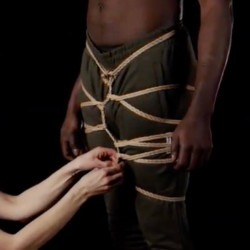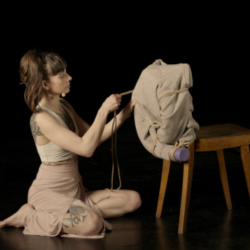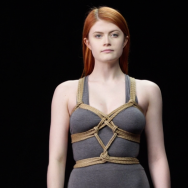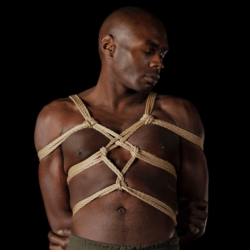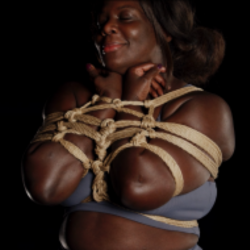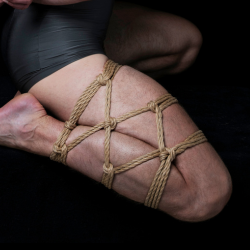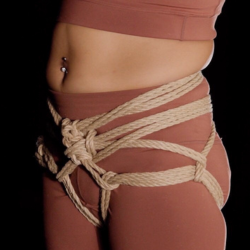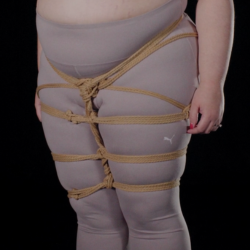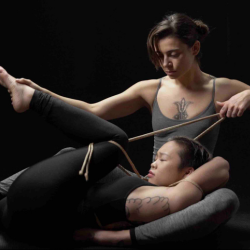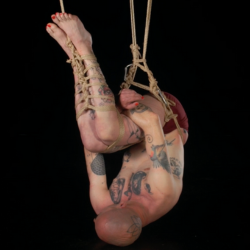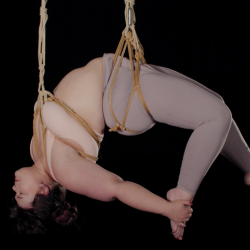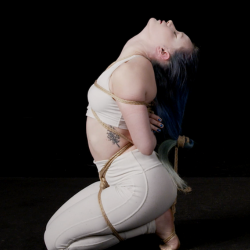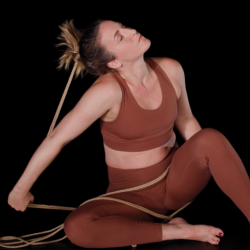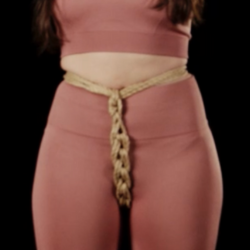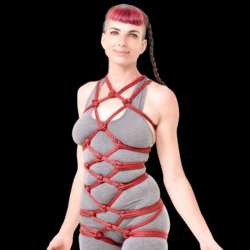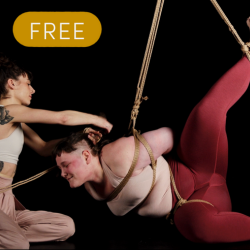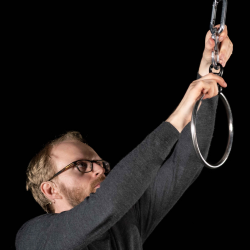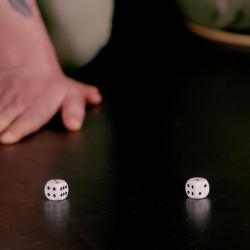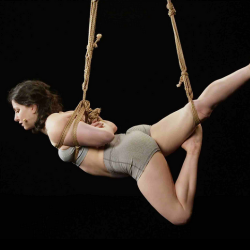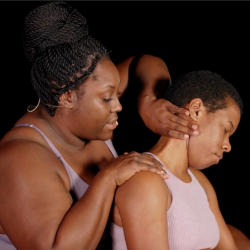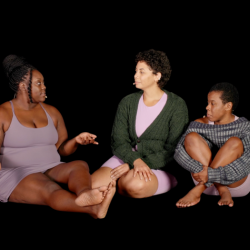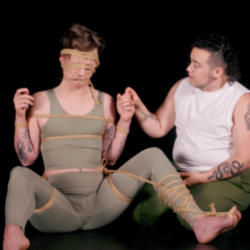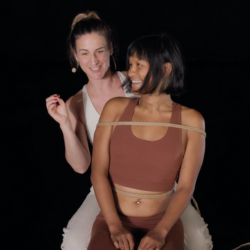EP 15
MOBIGHTS
Principle over pattern! This is Mo's mantra as he sits down with Wren and reflects on his 13 years of doing rope, exploring the significance of the journey over specific end goals and the importance of building a strong, supportive community on the Shibari Study Discord.

MoBights is a Rope Nerd based in Manchester UK, tying for around 8 years with his wife PixieSeraphina and Community Manager for the Shibari Study Discord. Mo enjoys all aspects of rope, researching its rich and diverse history, constantly learning, occasionally teaching, and somewhat obsessively talking about rope on the Shibari Study Discord.
Wicked Wren [00:00:12] Welcome to the Shibari Study podcast, I'm your host Wicked Wren. And today, we have on an amazing guest. You will know him from the Shibari Study Discord. Today, we have on MoBights. Mo is a rope top in the UK. He's the moderator and community manager of the Shibari Study Discord. Mo, hello.
MoBights [00:00:32] Hey, Wren. How are you?
Wicked Wren [00:00:34] I am so great. You've been involved in rope for a really long time. It's like over ten years, right?
MoBights [00:00:42] Yeah. I mean. Oh, Lord, when you say it like that, I've been, I keep saying to people, have been saying six years for five years. So yeah. It's definitely getting to that point. I think really probably, I would say 13 years, the first three or four of those years shamefully so. My rope was terrible.
Wicked Wren [00:01:02] Everyone's is.
MoBights [00:01:04] Yeah. And it was bedroom bondage stuff, you know. I definitely credit my wife who introduced me into that kind of world. She was like, I want to be tied up, But I'm like, Cool, okay, right. And then we had really terrible rope and I was just really, really bad. And then at some point, I think back in the sort of early days of Tumblr, I discovered some really interesting looking rope that was like, Wow. And it totally blew my mind. And then from then, I kind of... That's when I consider I started doing rope. I realized actually when I look back on it, I've always kind of done it a little bit in different ways. But yeah, definitely ten-plus years, let's say somewhere in that range.
Wicked Wren [00:01:46] When your wife came to you and she was like, Tie me up. Was that the first time you did anything (…) or?
MoBights [00:01:52] It was the first time I felt free to do something like that. She's a very liberating person and I think allowed me to definitely explore and delve into those things. I've always kind of been a bit of a (…), I guess, but, you know, someone giving you that freedom to really explore that is a whole different world. And, you know, she very much brought me out of my shell where those kind of things are concerned. And, and, you know, the idea of being in kind of top, I probably wouldn't have considered myself particularly toppy or dominant beforehand. But she definitely curated an experience where I got to enjoy that side of myself a little bit more. So yeah, so it's been an interesting ride, but it was, I say, more of a more of a blossoming than a discovery I would probably say.
Wicked Wren [00:02:42] It sounds like she set up a space for you to kind of grow and explore. That's pretty incredible.
MoBights [00:02:47] Yeah, definitely. An incredible person, I'll be honest. We've been together for a long time, so it's really nice to have grown alongside someone during kind of my rope experience. And as I've kind of got into kind of more complex rope and more connective rope, that's not just restraint that could be cuffs or handcuffs or chains or steel or anything. Something about rope was kind of special. And I think in the early days it was very much just this is functional. Now it's completely different. And the way we interact with rope is totally different than how we may have done like say, sort of ten-plus years ago. And the experience has been very different for us to to grow together during that time. So that's been really cool.
Wicked Wren [00:03:32] It says a lot that you're still doing stuff together, you know, after that much time.
MoBights [00:03:37] Yeah, totally. I think we find lots of different ways to explore and connect to each other. And life throws its ups and downs at you. But I think after 13 years, we've very much kind of grown accustomed to each other. We like to keep things interesting for each other. We like to not take each other for granted as well and give ourselves both the space and freedom to do things that we want to do as individuals, but also kind of making sure we retain that kind of sense of connection and rope is one of the ways in which we do that. There's many of us, but it's one that kind of really has been different in how we interact I guess.
Wicked Wren [00:04:21] You said that was different than if it was steel or cuffs or chains or whatever. What is different about ropes specifically? Like what made that stand out?
MoBights [00:04:34] I think, it naturally is. Particularly for me, there's a warmth to it and a tenderness to rope that, you know, if you're doing things with a say kind of leather or steel, I mean, leather maybe. Maybe it's a bit more worn, but steel particularly feels kind of cold to me and isn't something that if I'm kind of working in terms of restraint, doesn't feel like an extension of myself. Whereas rope and natural materials tend to feel more like that. Like for me, the way I approach rope is like, I don't have enough hands, right? I only have two hands and I can only hook you in so many ways. Whereas rope feels like an extension of that, it's a prolonged hook. I placed it there. And then it's still there and it can still be there 30 minutes later. And it's that, I guess, kind of tactile warmth and sort of natural feel to it where compared to things like, say, like handcuffs or other forms of restraint, I don't feel that same inspiration from. I guess it doesn't feel so natural and organic to me. So that's, I think, something that really stood out about rope that made it different. And it's remarkably flexible as well, like handcuffs off kind of one job, right? Whereas rope can have many jobs and I've used it in many, many different ways over the years. It's an impromptu flag or a whip if you want it to be. It's a way of restraining people. It's an experience. It's an extension to communicate with each other. So I guess that flexibility of rope as well also is something that I find really appealing. And it's definitely been something that's kept me coming back to it. I mean, we've tried many of the different (…) things and some of them stick and some of them don't. Rope's been one that's kind of hung around and I like that.
Wicked Wren [00:06:21] It is funny how the people that like heavy bondage and cuffs and things like that, they're usually, they're not so into rope the way that quote-unquote rope people are.
MoBights [00:06:33] Yeah, definitely. I think there's a different mentality. So it's function over form. I guess if you're into the kind of heavy stuff, it is very much function for another purpose, whereas I think rope people kind of are more about the journey to the endpoint. Sometimes, it's not just I want to tie you up because I don't want you to move while I do something else. It's more we're enjoying the process of getting from here to there. And even if there is undefined, even if we don't get to like a pre-determined endpoint, like you can just enjoy the journey. Whereas I think when you compare that to kind of other, I say sort of heavy bondage, it's very much for its purpose and often it's secondary to something else. Whereas if I was with a lot of rope people, the rope isn't necessarily secondary to something else. It's its own primary thing. So that tends to be something I kind of perceive as a difference in approach, and that's not universal. But it is something that jumps out to me, particularly with, I guess, the people that I spend time with kind of doing rope or the people I interact with on the Internet, which seems to be a growing number of people these days. But yeah, it's, you know, we enjoy the journey, not just the destination.
Wicked Wren [00:07:50] What a very cool way of pointing that out. I never thought about it like that. Rope is more about the journey versus other forms of bondage are there so you can do something else to the person. That's really, really nice.
MoBights [00:08:02] Yeah, often times yeah.
Wicked Wren [00:08:03] Do you find that in your scenes, do you think about an endpoint?
MoBights [00:08:08] I definitely used to. A lot of the sort of initial attraction to rope was quite aesthetic for me. So we used to take a lot of photographs that used to be very much a kind of like we wanted to create a certain form or a certain look. And that very much drove that experience to be I'd say the gratification was reaching that goal. And then I think as I learned more, researched more, spent time with more people, that's dramatically changed. Whereas now I'm less concerned with the endpoint. I mean, the last kind of year, I don't take many photographs anymore. It's not something that's in my mindset to kind of be like, Oh, grab a picture. I'm more in the moment and enjoying it. So that's changed a lot. But I do think there's times when I have a kind of idea of where I want to go. But I guess I'm no longer disappointed in myself if I don't get there. And that's probably something that's happened a lot in the kind of last year where I've done kind of different workshops and classes that led in towards the ideology. I'm very much, I say, kind of enjoying the journey and looking at some different cultural approaches to rope. It's definitely expanding my mindset in that sense. It's not to say having a, you know, preconceived idea of where you want to go is a bad thing or taking photographs is a bad thing. These are wonderful things to do, but it's just where I'm at right now. And I think it's nice to kind of acknowledge the where I'm at right now is where I've always been and where I've always been and will always be constantly changing and kind of fluid in that sense.
Wicked Wren [00:09:50] Was there a time where you were disappointed with not getting to an end goal? Does that make sense?
MoBights [00:09:57] Yeah, totally. Yeah. And I think is what the end goal might be is, you know, it might be a sense of feeling, it might be a particular shape or, you know, a certain position or something like that, or a particular suspension pattern or sequence. But yeah, there's totally been times when I've kind of got frustrated that I haven't reached that goal. A lot of the time it's been where we tried to kind of have a quote-unquote scene and it's just sort of turned into labbing and it's not, the connection isn't there, the emotive side's not there, it's just following the steps and going through the process and it's just a recipe of rope and that probably the most frustrating times. Whereas I think the times when we've not set out to have a scene and we've just been able to go and do some rope have been the best scenes ever because there's never preconceptions, right? There's no boundaries and it just goes wherever it goes. And it's enjoyable for the sake of it being what it is, not where it's going. And now I think for me, when I first learned suspension, I was more goal-orientated. It was like, Oh, we want to do this particular suspension. And if we didn't get there for whatever reason, it was frustrating. Whereas now I care a lot less about that. It's probably now I've got over the technical hurdle of learning suspension techniques and now I do less of them. I do more flow work, more partials, and they're the more enjoyable things for me than necessarily kind of, Oh, we'll get up in the air and we'll fly around and be floating and stuff and it's great and then we'll come back down and finish. So yeah, it's definitely been lots of ups and downs of disappointments and rewards and progress. It's been pragmatic, I think really about all of those things that has got me through because there's probably times when I would have gone, you know, this isn't working and stopped, but we've changed direction and done things differently and work together to kind of find that path. And again, that's something that I think is been really impactful on me is that I tied with the same person all the time. So, you know, we get to negotiate through all of those things together, and sometimes it works for one of us and not the other. Like finding that balance is an interesting journey in itself.
Wicked Wren [00:12:03] Isn't it funny how once you get the technical aspects of suspension down, you're not worried about it all the time? You kind of tend to go back to the ground and you're like, Oh, partials and floor work is more the fun thing to do.
MoBights [00:12:18] It can be for sure. I mean, I think this sort of like escalator path to suspension, a lot of people jump on, right? They start rope and they see these wonderful suspensions and like they're great to look out and I think you see performances where people are having these almost transcendental experiences and everyone's like, Oh, we've got to get in the air. And then I think once you get in the air, like you say, the sort of fear of overcoming the technical hurdle, really opens things up for people where you don't always have to do suspension, but you have that tool available to you. And I think for me, when I was first learning, there was definitely a lot of fear around a lack of correctness, like, am I doing the right things? Is the harness balanced well enough to to be supportive and as I've kind of learned the principle behind that, not just the pattern which we follow and be able to kind of strip things back and understand how a harness works, how weight and load shifts in a harness, and actually don't always have to be in the air to do that. You can do a lot of that stuff in partial and it's having the ability to change the approach for different circumstances. So there's like, there's been times when I've wanted to achieve a certain shape and suspension and instead of doing it in suspension, we've done it in partial and it's actually been really rewarding. And one in particular I've never even done successfully in a suspension, but we've done successfully on the floor a number of times. And actually, that's enough for me. That's okay. I don't need you to be in the air for us to still get the same feeling and sense of experience. So yeah, it's very much kind of overcoming that fear opened up a lot of different avenues to explore in different ways. And then we kind of realized actually it's nice to be on the ground sometimes. It's a different way to play than just always being every session has to go in the air. Every rope scene has to end in a suspension like always. But it's changed our approach in that sense.
Wicked Wren [00:14:17] It sounds like what you're referring to is knowing the principles of the patterns rather than just knowing the patterns.
MoBights [00:14:26] Ohh, I love these. Yeah. People that know me or taught over the last couple of years will probably be bored with same principles over patterns, But it's like, that's my mantra is, you know, you can learn 50 different harnesses, but if you don't understand how they work, did you really learn anything at all. Y follow the recipe sheet and like, I love cooking, like I enjoy cooking. And I think there's similarities between cooking and rope in certain ways. Like you can get a recipe sheet and you can follow the recipe and you can make the meal, right? But is it really going to taste the way you want it to taste if you've never understood why the flavors work, how it's balanced, like what things you want more of or less of is nuanced. And when we talk about adapting rope to different bodies, I think if people really understood some of the principles that sit behind the pattern, why something works, they would probably be more empowered to adapt slightly and not just follow the process and not just go. This is step one, this is step two and, and then achieve the pattern at the end of it. That's great. But I think if we really delve into the principles of how things work fundamentally, you know, what we're trying to do is provide support, restraint, a feeling of constriction. Like potentially freedom in contrast to some of that constriction. And when we sort of get into that world, I find that we can be a lot more creative in our approach. And that's the difference between the sort of science of rope and the art of rope for me. The science is the is the process, right? And you learn by replication and we mimic and we get taught. But then at some point you kind of have to find your own voice and your own expression in rope. And I think once we get to the principles of the technique dialed, you can then really start to play around with it and then it opens up a whole different way of exploring more rope and really how you express yourself in rope.
Wicked Wren [00:16:23] Yeah, I do have a kind of off-topic question. Are you an Alton Brown fan by any means, or were you a Good Eats fan?
MoBights [00:16:31] I'm not that I'm aware of.
Wicked Wren [00:16:33] Okay, well, never mind. I was curious. You're talking about the science of food and cooking and things. It was all really in line with the TV show Good Eats and Alton Brown and like, Adam Ragusea and things. I just curious.
MoBights [00:16:45] I have to make a note because I love food programs as well. So I am a big fan of various different food programs like.
Wicked Wren [00:16:52] Alton made Good Eats. It really talks about a lot of the science, quote-unquote, behind cooking. And he talked in these absolutes. And looking back on it, it was actually really hard because he had this really definitive way of saying something. He'd talk about a risotto and he was like, if you are making it, it should take this long and should take this much time. So as a kid, I was sitting there trying to make it and it wasn't coming out because I didn't understand the concept of what we were doing. I was just listening to someone and in rope classes I get frustrated as a bottom when we're just being taught a pattern very quickly. And then the top I'm with and I are both trying to just remember the pattern, much less understanding why things are happening and no one's really getting anything out of it. And then the feedback that I can give as a bottom isn't qualified. It's not like does it feel good, does it feel bad? I'm not really sure because this is the first time we've done it and.
MoBights [00:17:54] It's always at that point of reference. Yeah, I think definitely that's the case and kind of whenever I kind of taught groups, I tend not to do pattern-based teaching. I'm a big fan of using like Ichinawa or Ipponawa depending which school of thought you come from. And the sort of one rope technique where it's very fluid and you're not highly in a technical mindset because I think it's more accessible to groups of various different skill levels, which is kind of where I've done workshops like ad hoc things, events and stuff. A lot of people's first time in rope, and I think it's much harder to do that when it's a pattern-based approach. But recently we did a workshop with Docvale and Banana, which was incredible because they really deconstructed some of those issues in terms of they would show a pattern but then really empower people to if this isn't appropriate for you, that's fine. So they might do a pattern with a gote, for example, and then say any chest harness will work, like do a chest harness you're comfortable with. Because they didn't want people getting kind of caught up in following the steps and executing the exact same gote that was tied. They were more interested in getting people to think about the experience they were looking to have and how they communicated with each other. And when you looked around the room, what you found was all of these sort of nuanced interpretations of what people had been shown. And that was wonderful to not see people doing a cookie cutter rope and just following exactly the same thing and then seeing 12 people with the exact same shape. It was 12 like slightly nuanced and adapted, and everyone was conscious of their bottoms limitations, their desires, the things that they wanted to feel and were able to really tweak it. And that for me was different to what the kind of classes that I've seen or been to where it is that, you know, follow these steps and do these things. And it's important in some ways if you're trying to learn a specific pattern that has specific important or specific structural integrity, what you can't play around necessarily. But I did really enjoy the ability to have some freedom to interpret, and it helps that the skill level in the room was very high. It helped that, you know, people were, were very comfortable with what they wanted to tie. And I think on the second day as well, we had been tying gote all weekend, which for us is a bit of an Achilles heel. Gotes in general. And it's been a focus for that kind of last year for us to break through that wall. But it's been the longest time that we've been tying gotes in a kind of prolonged session. And then by the second day we were like, you know what? We're just going to go with a nice, comfortable arms-front harness because, you know, we're both tired. Like we already kind of felt like we'd achieved something with the gote in the first day and a half. So by that point it was like, actually, let's just do something that's really like comfortable, sustainable, that works for where we're both at. And I felt confident to tie because I was tired and my wife felt confident to be tied in because again, her body was tired and the strain on the shoulders and things. And it was nice to be an environment where that was really fostered as a good thing was no one was scolded for going off script. Like it was like, Oh, it was really cool to see the differences in how people approach stuff. So that was that was super nice.
Wicked Wren [00:21:20] Yeah, yeah, yeah. Nothing to prove by doing TK for, you know, another day or something.
MoBights [00:21:25] Yeah, exactly. It was like that I think would have been like the seventh TK of the week. And then I'm like, okay, maybe no, maybe not this time. Because like, the other ones that we did were great. So like, quit while we're ahead.
Wicked Wren [00:21:36] Yeah, exactly. I with a lot of talk about community management with you. So you are the community manager of the Siscord with Shibari Study and it's a pretty amazing place to see because there's all these different channels, there's different avenues for people to talk. Everyone's very engaged in the Discord as well.
MoBights [00:21:59] Firstly, I mean, I can't take full credit for that. You know that the Discord as an idea was something that was incepted before I joined the team and the general sort of construct of in the setup I was a member of. I really enjoyed that space to be able to talk with like-minded people. And it's something that I've always been somewhat passionate about. So I've done community management professionally in the past. It's something that I've done as a hobby when I used to be kind of into e-sports and then racing online with different people and I set up a community for people to meet for weekly races and stuff. And we had a league and it was great. And then my world changed a little bit. I got more into rope and switched my obsessions. So I've always enjoyed kind of, you know, engaging with different people across cultural boundaries, across geographical divides. So when I sort of discovered this Shibari Study Discord, I was like, Oh, this is really cool place, and it was more kind of serendipitous that I became the community manager and it was very much something that, you know, there was a post one day that was like, Hey, we're looking for a new community manager. And, and I was like, Oh damn. Like, I actually have a qualification in this. And I really enjoy rope and I like being here anyway. So like, maybe this is something that I can, I can, I can do. So I threw my hat in the ring and then I guess the rest is history though that's very cliche. Like, no, it's not. It's, it's the present. It's right now. It's happening.
Wicked Wren [00:23:34] Right now. It's not going anywhere. It's only growing.
MoBights [00:23:38] And that's the thing. I think from kind of joining the team and being a part of that, I was very, very passionate to make that community a really healthy space for people to be in. You know, we've got some really good community guidelines around how people conduct themselves. We very rarely have to kind of moderate that sort of role of moderator. We don't really moderate in the community. It's very self-moderated. People are just generally really respectful and.
Wicked Wren [00:24:04] Except when Tomporarily comes in and just gets on hand.
MoBights [00:24:07] Well, you know, some people just like to watch the world burn.
Wicked Wren [00:24:12] You know, he's just, he's unhinged.
MoBights [00:24:14] I mean, I love it as a contrast to that. He in particular actually has some really useful contributions to the community as well, otherwise.
Wicked Wren [00:24:21] Oh, Absolutely.
MoBights [00:24:21] But I think, for me, what I really love about that space is that I see people just coming together and really exploring the differences in how people approach stuff. So for me, my sort of physical rope world is very UK-centric and that's quite aligned to the sort of European way of doing work. Like we all have a sort of shared history, I guess a little bit. It's very traditional. There's a lot of Jew, there's a lot of kind of experience of scenes is quite slow, I guess, in certain ways. Whereas when I kind of got onto the Discord and started talking to people from different places, like I realized so many people have different approaches to rope and, and my kind of background of doing decorative rope or very aesthetic rope. There's still a strong community doing that. And then there's people that are into Western bondage, which we probably don't give enough credit to. But there's a whole really interesting, diverse history of our Western bondage and how that works. Going back to the days of John William Bizarre magazine, which if I'm honest, has whole connotations around foot (…) and heels and stuff that I love and a vibe with that. So that's another conversation for another day. But then I look at stuff happening in the Bay Area and there's a lot of what I call kind of circus rope, but really performing very dramatic stuff. And I don't see so much of that over here and I wouldn't be exposed to that without a place like the sort of Discord community. Because people are sharing the things that they're up to every weekend and things like Folsom Street Fair when I'm like, I don't even know that existed beforehand. And it's a whole cool thing that I'm like, Wow, that'd be awesome. We don't have so much of that over here. So I guess for me, I really enjoy how bridges over those cultural divides and people can share and have different experiences. And and we start to learn more from each other in a supportive environment rather than in isolation. And I think we've probably all got to where we are somewhat in isolation. But now, because the more of these communities and more spaces where people can connect across geographical divides, it's really been interesting to see how that develops, the general sort of global rope community as well as just the, the pockets that we all live in physically.
Wicked Wren [00:26:38] Can you talk a little bit about what makes a strong community from your perspective? And what are some tools that you use to kind of foster conversation? Does that make sense?
MoBights [00:26:52] Oh, you're going to make me give away all my secrets.
Wicked Wren [00:26:54] Giving away all secrets now.
MoBights [00:26:58] I'm a huge people person. I love people. That's my biggest thing. And you know, rope and (…), for me, it's about people connecting. And this is community management is another way that people connect. And I think a really strong community is about people feeling a sense of representation. About people feeling a sense of identity in that community. And that has to be shaped by the community itself. Like I could sit here and try and really drive a certain type of community, but I don't like to do that because I find it quite homogenous. And you create echo chambers when you do that, and if you're really strict about the type of people you want in the community, the type of conversations you want to have, like it becomes like a self-fulfilling prophecy that the only things that you will have. Whereas what I try to facilitate is a space for people to just really talk openly. I like people to challenge each other respectfully, to bring different opinions together. If things are a little quiet, I'll probably start to like, you know, prompt a notch a little bit. So I don't know anyone that's joined in the last couple of months. There's probably a point where I've gone as a gentle nudge. Introduce yourself. So when anyone joins the community, they get a little notification that says, like, check out community guidelines and come and introduce yourself or maybe share a photograph. And a lot of people, I think, are dead nervous about doing that because the community is established and Shibari Study has a brand. And there's a bit of almost anticipation where people don't want to be like, Oh, hi, I'm new here, have been doing it for two months when this people have been doing it for years. Yeah, but I really like the people that bring new perspectives. I like to know why people got rope, what sparked their interest. And I will periodically kind of tag multiple people who haven't maybe introduced themselves and say like, you know, let us know a little bit about yourself. Where are you from? Like what kind of rope do you enjoy? What got you into this weird and wonderful world of perversion that we all live in. And they're the kind of things where I think I try and sort of be moving the community around a little bit in terms of like prompting conversation. But for the most part I just enjoy getting into the conversations people start. It moves and it's fluid all the time around. Sometimes it'll be about equipment, sometimes it'll be about experience. The bottoming channel has some great stuff there. You know, I find quite unique in Shibari Study Discord community is to have really pushed to have a lot of representation for bottoms and for them to talk freely about their experience. And when we rolled out the partner feature, that was huge because I think a lot of subscribers of Shibari Study tend to be tops because what we're doing is teaching people patterns and ways to tie. There's some really good content for bottoms. Fuoco's kind of like body care, body conditioning, like the first rope date content that just came out recently. We're getting more aware of targeting content towards bottoms to make them feel engaged. You'll sign a class and you'll learn and there's nothing towards the bottom half of the room. 50% of people aren't really getting to know of it. So that was a big thing when I joined to try and facilitate more people having those conversations and for bottoms to share their experiences and to really think about things not just from a top-centric perspective. And when we rolled out the partner feature, that made a huge difference because then we got a lot of people that were on the other side of the ropes in the community, and they were able to share their experiences and broaden people's horizons. And that's something that for me is a top again, like, I don't want my perspective of rope to be tainted by just my kind of viewpoint of the world in the top-down view. Like, it's really important for me to be shaped by what my bottom wants to experience and how they want to be feeling in their rope and how they want rope appliance the way they want it or don't want it and that's different for everybody. So that was a huge thing for me to to kind of facilitate the rest of it. It's just super organic. I mean, it's just a really great bunch of people and just like 650 of them right now. So there's a lot of really good people.
Wicked Wren [00:31:12] Can you tell me about the partner feature really quick?
MoBights [00:31:16] Yeah. So I guess one of the things with the community is that it's specifically for Shibari Study members. So it's a close community. There's an ideology behind that, which is to give people a safe space where they feel like they can be open and honest and not have to worry that, you know, the whole world is watching what they say on like kind of social media, like Instagram. Everyone's going to read every comment that you make. Like it is a more closed community in that sense. But because initially, you had to have a subscription to Shibari Study to join, it was a say, the subscriber that joined. And what the part the feature allowed us to do is kind of say, look, we value both parts of the story, the top and the bottom. Something else that I was quite conscious of in the early stages of designing the partner feature was it was initially designed that people could add one partner and I was like, Is that really representative of a lot of people in rope relationships? And so we, we extended that and people can add two partners. There has to be a number at some point, I guess, like it can't just be unlimited. But we kind of felt that the two partners really reflected like the sort of primary rope relationships that people would have. I think I have made one exception to allow someone to add a third partner at one time, but it was very much about kind of adding more balance to the conversation. And it not just being a bunch of tops in a room talking about rope, which is fine in one sense, but I think having that other side of the story really did change how the conversations went. And attracted different people to the Discord as well to share their experiences. So that was super, super important for me to provide some more balance in that sense. And it's been really nice to see people bring their partners along and talk freely between themselves and also for partners to talk to each other as well. Like outside of the watchful eyes of all these rope tops.
Wicked Wren [00:33:13] I feel like that's one of the hardest things about bottoming is that you kind of are in a vacuum. You can talk to other tops, you can kind of talk to your friends that are bottoms, but there's not a big community of people getting tied. It's hard to reach out to someone else and say, My shoulder really hurts when this thing or this thing happens. How do you feel about it? Those are hard conversations to have, so the bottom channels are awesome for that.
MoBights [00:33:38] Definitely. And I think if anyone's listening, get in there and have more of those conversations because for me, I like to I like to read those conversations. I like to see what the other side of the story looks like. So, yeah, certainly it's really important for people to be able to have that. And again, being on the Internet, being accessible to people across geographical divides really opens that up to not just say your so small group of friends that that might be bottoming that you feel confident enough to talk to. It really gives people a lot of a broader kind of perspective of experience.
Wicked Wren [00:34:13] Yeah, to echo that, I would say just get in there and talk and it might be scary because there are a lot of people in there and you're new or whatever, but it's not, you know, everyone's nice, You just go in, introduce yourself and just kind of start talking.
MoBights [00:34:28] And jump into conversations like people. I think they get afraid to ask questions sometimes, and especially when we have sort of regular rope office hours with instructors, which is super unique to be able to have this like direct avenue to talk to the people that you see on Shibari Study. And I think people are really scared of asking questions sometimes. And I'm like, Please do. So I tend to go around and like grab questions that people have asked recently and pose them to the instructor to get their perspective. And it's actually like our most-read channel for our least message channel. So people don't comment in there, but tons of people read it and they're clearly getting good value out of the information. But I'm like, ask the questions because there are no bad questions to ask where ropes are concerned. Especially if you're if you're new. Challenge the people that have been doing this for a long time to ask them why and to understand why we do certain things. And for people, I've been doing this for a while. Help the new people to understand why we make certain choices over other things and you know, how we can all work together to just create a better space.
Wicked Wren [00:35:35] I was going to say one of the best things is someone that hasn't been in the scene for a long time coming in, asking quote-unquote, common sense questions because they haven't been fed the script of what a quote-unquote power bottom is or the TK is the only way to how to be in a chest harness or whatever. Like that perspective is so valuable and we never really hear it.
MoBights [00:35:59] No. And I think for me, it's always great to challenge ourselves with stuff like that. When people ask us those, I say the common sense questions that we might have started to take for granted because we've just been curated to do things the way things are done. And it's only through people really challenging that I'm going actually could we do this differently, that we've created some interesting new approaches and new harnesses and things of that to solve a problem. And if no one actually points out the problem, we never solve it. We just all carry on blindly tying TKs and ripping people shoulders out. And, you know, so someone at some point when actually maybe you could just put your arms forward maybe or just have them arms free. Tif might come up with the Tenshi and sub the chest. We'll just do arms. And I'm like, Okay, cool. Like, this is development and it's how we evolve, so we definitely need more of those questions.
Wicked Wren [00:36:53] Is there anything coming up with the Discord, anything on the horizon that we should keep our little eyeballs peeled for?
MoBights [00:37:01] Uhh, so Discord specific not so much because we're doing a lot of work behind the scenes on the blog.
Wicked Wren [00:37:10] Tell me about the blog.
MoBights [00:37:12] Oh, right. So the Discord people know this. They know it's coming. But we've been doing work to really add a different way for people to interact with, with shivers to do so. Obviously, a huge amount of what we do is creating content for the site, this tutorial-style content. But there is a demand for different ways of people to interact and different media types. And a blog really extends the way in which we can we can give people information at a different pace as well. Like sometimes you don't always have the ability to sit down and watch a video for 30 minutes. And sometimes it's not about learning a harness more about the experience. And this is something that is very much benefited from the community. So we're looking at some of the things the community have asked for and how we can translate that into different content. That's not necessarily going to be the (…) video content, but it gives people an insight. And it's the same with the podcast, right? You know, this is adding extra value for people that might want to listen to a podcast when they're on the train, going to work on the commute or, you know, they're not able to watch a video because they can listen to something. And it gives people a different insight and a different lens that we're not just looking at these amazing instructors doing this awesome stuff that might be inspirational or might be educational. We're also humanizing that. And I think the blog is... I'm super excited for that. We've kind of curated a little bit of content from community members. We're looking at how we can listen to the community and translate that, I say, into different ways for people to sort of consume rope content that is really valuable to them. And like I say, kind of some of the conversations about equipment, like we don't have many videos on equipment choices because it's not the most exciting thing to watch a video about. But we could definitely create articles on that, like what different rope types are like why you would choose certain rope types in certain situations, like different kinds of hardware and all of that kind of stuff isn't the... Video is not the best medium to do it. So the blog really, really expands upon that and it means we have a reference guide for the community as well. When people ask certain questions, we can then say, Look, we have this article. It gives you a lot more information than I can sit there typing out over and over again. And that's something that is going to really support what we're able to do in the community. Other than that, I mean, more sort of rope office with the instructors are going to happen and I'm thinking of ways in which we can do more interactive stuff with the community as well. So I'd love to do like a virtual rope jam where people can just get together online and just tie. No, no expectations. No, we're not learning something per say. We're just sitting. People are tying, people are watching and just having that sort of shared experience. But it's. getting the time to be able to do that. That suits everyone because like a lot of our audience are in the U.S., I'm in the U.K. There's a time difference. So it's... I'm still trying to find the right time to be able to do that. I've road-tested it a little bit here and there. It's been interesting, but I definitely like to be able to do something like that in the future where people can have that fly-on-the-wall view. It's all the people's rope world. So, I would definitely be something that I'd love to do more.
Wicked Wren [00:40:46] God, that'd be huge. It's funny, the actual activity of rope is the only thing we do in a vacuum. Like, we don't have insight into people's personal rope, but we do have insight into what kind of dude they like. All these kinds of things we can see it from pictures. We can see like, like a snapshot of it. But I think seeing people's actual scenes would be so, so helpful, but also very, very vulnerable.
MoBights [00:41:13] Yeah, super vulnerable. I think for me, I love that humanization of it because again, I say we look at people online, we see people do performances, we look at the teachers in videos. And I think sometimes we forget they're people. They just become like dispensers of knowledge and these oracles that we put up on a pedestal. And I guess I say kind of having more of that human interaction where we see people just having real true organic connective rope experiences that sometimes might be great, sometimes might be not so great, like and demonstrating that to people, that is kind of what the real world looks like, not just what we post on the Internet on social media, because that was the great photo that we took and put through 15 different filters and went, Look how amazing this was for 3 seconds before we came down. Like, you know, people seeing the journey, not just the destination. I think that's something that would be would be really, really cool to do. I just need to find the right time to get people together where we can be like, Let's do this thing.
Wicked Wren [00:42:13] Yeah, well, where can people find you, Mo? What are you up to? Anything going on?
MoBights [00:42:19] Discord mostly. Like I'm passively active on Instagram, so, like my handle on all socials is @mobights so you can find me on Instagram and Twitter. But as I mentioned before, I'm not hugely active in terms of putting out content. I tend to just like see what people are up to, get inspiration, but my DMs are always open if people ever want to ask questions and if you're on the Discord, you'll know that I'm I'm quite avid at talking on there and happy to share my opinion. So yeah, definitely come and say hi. Or if you see me around events, I'm at a few in the UK. Manchester's got a really good rope scene and some great, great people here traveling a little bit more down at Nottingham, seeing different people around the scene. So if anyone ever sees me, I've usually got a mohawk and makeup on. I'm easily spottable. So come say, Hey.
Wicked Wren [00:43:14] I thought I was going to see that mohawk today.
MoBights [00:43:16] I know. I'm sorry.
Wicked Wren [00:43:18] It's okay.
MoBights [00:43:18] It's there. It's just got it's a Thursday and it's the week has been long.
Wicked Wren [00:43:22] Look, I understand. I mean...
MoBights [00:43:25] Catch me on a Saturday and it's right.
Wicked Wren [00:43:27] Yeah. It's a day-dependent mohawk.
MoBights [00:43:30] Yes definitely. Definitely. It takes days off. It needs a rest.
Wicked Wren [00:43:33] Yeah, I understand. Well, Mo, thank you so much. I appreciate you talking to me.
MoBights [00:43:37] Well, thank you, Wren. It's been awesome.
Wicked Wren [00:43:39] Yeah. Thank you so much for what you do in the Discord. You've curated conversations in there that are really special.
MoBights [00:43:46] Well, thank you. That's so sweet. That's all I ever want it to be is just like special conversations with people who enjoy it.
Start your free 7-day trial
Get one free week of unlimited access at Shibari Study,
then pay from $17.90/month. Cancel anytime.


